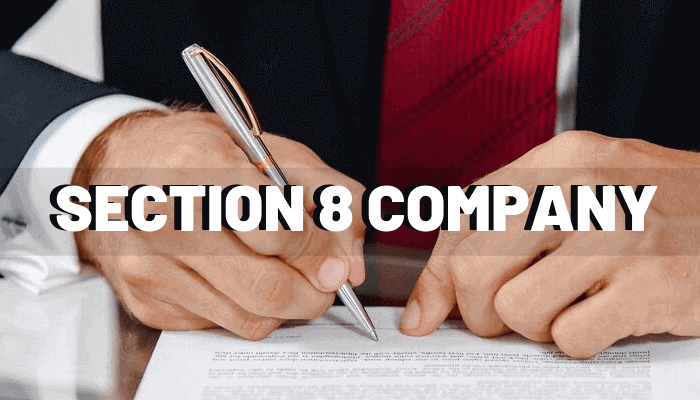This blog offers a detailed exploration of Section 8 Companies, a distinct legal entity dedicated to noble causes. It covers incorporation, capital investment, and compliance obligations. FAQs on financial reporting, auditing, consequences of non-compliance, and exemptions are addressed for a comprehensive understanding. Get insights into the legal framework and regulations governing Section 8 Companies.
A Section 8 Company, also known as a not-for-profit company, is a unique legal entity that operates for the promotion of charitable, educational, scientific, religious, and social welfare causes. Compliances play a vital role in ensuring transparency, accountability, and smooth operations of these organizations. Let’s delve into the key aspects of Section 8 Company compliances.
Section 8 Company
A Section 8 Company is a type of non-profit organisation established with the primary objective of promoting social welfare and charitable activities. Unlike other companies, Section 8 Companies do not distribute profits to shareholders but reinvest them in furthering their objectives. They are registered under Section 8 of the Companies Act, 2013.
Who can Incorporate
A Section 8 Company, also known as a non-profit company, serves a noble purpose by promoting charitable, educational, religious, scientific, and social welfare activities. Anyone with a genuine intention to work for the welfare of the community can incorporate a Section 8 Company. Whether an individual or a group, the founders must share a selfless commitment to the chosen cause. The primary objective of forming such a company should be to benefit society, rather than seeking personal profits.
- Founders must submit essential documents, like Memorandum and Articles of Association, to RoC for Section 8 Company establishment.
- RoC evaluates objectives and activities for compliance with statutory requirements.
- Prior community welfare initiatives may be required for registration.
- Registered Section 8 Companies can seek financial aid from governmental and non-governmental entities.
- Legal framework ensures transparency, accountability, and dedication to the company’s altruistic mission.
- Ideal platform for those aiming to make a positive impact on society.
Required Capital Investment
Section 8 Companies distinguish themselves from traditional companies in their capital structure. Unlike regular companies that issue shares to shareholders, Section 8 Companies do not have a share capital. Instead, they function on a guaranteed basis, which means their members provide a guarantee to contribute a specific amount in the event of the company’s winding-up or liquidation.
The guarantee given by the members serves as a commitment to use their personal funds to cover any outstanding liabilities of the company if it ceases operations. This arrangement reflects the non-profit nature of Section 8 Companies, as their primary focus is on promoting charitable or social welfare activities rather than generating profits for shareholders.
The specified amount of guarantee is usually determined at the time of incorporation and is mentioned in the company’s Memorandum and Articles of Association. The amount may vary based on factors such as the company’s objectives, scale of operations, and potential liabilities. It is essential for the members to honour this commitment to ensure that any remaining debts or obligations of the company are appropriately settled during the winding-up process.
This guaranteed basis of capital ensures that Section 8 Companies remain financially responsible and accountable throughout their existence. It also provides reassurance to stakeholders, beneficiaries, and donors that the company’s resources will be used solely for its charitable or social welfare purposes. Additionally, this structure aligns with the company’s non-profit motive, inspiring confidence in the community and facilitating donations and support from various sources.
Operating on a guaranteed basis further emphasises the altruistic nature of Section 8 Companies, fostering trust among beneficiaries, donors, and the public. By relying on the commitment of its members, a Section 8 Company can focus on its core mission of making a positive impact on society without the pressure of generating profits for shareholders.
Applicable Compliances
Compliance is crucial to maintaining the legal status and credibility of a Section 8 Company. The following are some of the key statutory compliances that these organisations need to fulfil:
Company Incorporation:
File the necessary documents, including the Memorandum and Articles of Association, with the Registrar of Companies (RoC) to incorporate the Section 8 Company.
Tax Registrations:
Obtain Permanent Account Number (PAN) and Tax Deduction and Collection Account Number (TAN) for the company.
Annual Filing:
File annual returns with the RoC, including financial statements and other required documents.
Board Meetings and AGMs:
Conduct regular board meetings and an Annual General Meeting (AGM) to discuss company matters and financial performance.
Maintaining Statutory Registers:
Keep updated records of members, directors, minutes of meetings, and other statutory registers.
Income Tax Compliance:
Comply with income tax regulations, including filing income tax returns and paying taxes on time.
Audit Requirements:
Conduct a statutory audit of the company’s financial statements by a qualified auditor.
FCRA Compliance:
If the Section 8 Company receives foreign contributions, it must comply with the Foreign Contribution (Regulation) Act (FCRA).
Visit Vakilsearch for more legal advice!
FAQs on Section 8 company
What is a Section 8 company, and what are its compliance requirements?
A Section 8 Company is a non-profit organisation that promotes charitable and social welfare activities. Its compliance requirements include company incorporation, annual filing, tax registrations, and statutory audits.
What are the key statutory compliances that a Section 8 company needs to fulfil?
Some key statutory compliances for Section 8 Companies include annual filing, board meetings, tax compliances, maintaining statutory registers, and conducting a statutory audit.
Are there any specific financial reporting and auditing requirements for Section 8 companies?
Yes, Section 8 Companies must comply with specific financial reporting formats and conduct a statutory audit of their financial statements by a qualified auditor.
What are the consequences of non-compliance with the regulatory requirements for Section 8 companies?
Non-compliance can lead to penalties, legal actions, and the potential loss of the company's legal status. It can also adversely affect the company's credibility and reputation.
Can a Section 8 company avail any exemptions or relaxations in compliance obligations?
Yes, Section 8 Companies can avail exemptions and relaxations in certain compliances, such as income tax benefits and FCRA compliance exemptions for receiving foreign contributions. However, they must meet the specific criteria to qualify for these benefits.
Read more









